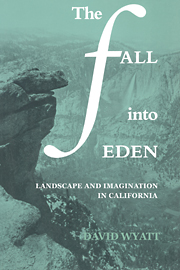Book contents
- Frontmatter
- Contents
- List of illustrations
- Acknowledgments
- Prologue: The mythology of the region
- 1 Spectatorship and abandonment: Dana, Leonard, and Frémont
- 2 Muir and the possession of landscape
- 3 King and catastrophe
- 4 Mary Austin: nature and nurturance
- 5 Norris and the vertical
- 6 Steinbeck's lost gardens
- 7 Chandler, marriage, and “the Great Wrong Place”
- 8 Jeffers, Snyder, and the ended world
- Epilogue: Fictions of space
- Notes
- Bibliography
- Index
1 - Spectatorship and abandonment: Dana, Leonard, and Frémont
Published online by Cambridge University Press: 18 December 2009
- Frontmatter
- Contents
- List of illustrations
- Acknowledgments
- Prologue: The mythology of the region
- 1 Spectatorship and abandonment: Dana, Leonard, and Frémont
- 2 Muir and the possession of landscape
- 3 King and catastrophe
- 4 Mary Austin: nature and nurturance
- 5 Norris and the vertical
- 6 Steinbeck's lost gardens
- 7 Chandler, marriage, and “the Great Wrong Place”
- 8 Jeffers, Snyder, and the ended world
- Epilogue: Fictions of space
- Notes
- Bibliography
- Index
Summary
First sightings have a way of foreclosing the future, and a book may one day be attempted on the way our vision of the West has been arrested by those original acts through which its landscape was given a character and a name. It would be a hard book to write; one of the most clearly defined frontiers in human history, the American West is also one of the most obscured by the rhetoric through which, from the beginning, it was packaged and sold. The West held out to its pioneers the chance to become primary, original namers, and yet when they came to write about it, these firstcomers often found response mediated not only by all the conventions of a language but by irrepressible myths of national and even human destiny. Even the man who had found the New World was preempted by the old thinking; Columbus tried to locate Paradise up the Orinoco.
The memorable western voices are those that somehow engage the felt tension between received forms and unprecedented experience. The tension is as old as the ur-document of western exploration, The Journals of Lewis and Clark. The drama of The Journals lies less in the shape they impose upon the West than in the tension between two kinds of voice. Clark's descriptive syntax seems at times overwhelmed by the shock of the new. Most moving here are those refrain sentences that register the sheer human need to keep track, sentences like “Deer scarce” and “Proceeded on.” Lewis's more aggressive and analytical style keeps perhaps too safe a distance from the surround.
- Type
- Chapter
- Information
- The Fall into EdenLandscape and Imagination in California, pp. 1 - 31Publisher: Cambridge University PressPrint publication year: 1986



